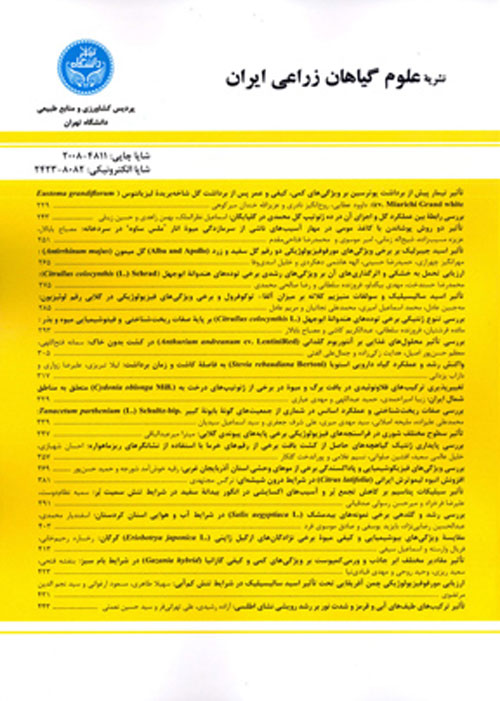Response of Tomato (Lycopersicon esculentum Mill.) Yield and Some Morphological Traits to Heat Stress
Author(s):
Abstract:
Climate Changes due to global warming is affecting world agriculture adversely. Heat stress due to global warming has turned to one of the most important factors reducing quantity and quality of plants production such as tomato. Despite of wide cultivation of tomato and high temperature effects on its production, unfortunately; research in this area is scarce. This study was conducted to investigate the response of tomato genotypes to heat stress. Stress tolerance of 11 tomato genotypes was investigated. Plant materials were evaluated at two experiments over one year under normal and heat stress conditions in a randomized complete block design with three replications in the greenhouse of College of Agriculture and Natural Resources, Persian Gulf University, Bushehr, Iran. Plant height, shoot length, days to flowering, yield per plant, fruit weight, fruit length and diameter, days to physiological maturity and days to harvest maturity were measured. Combined analysis of variance results indicated high significance differences among genotypes for all traits. The genotype × temperature interaction for all traits was also highly significant. Heat stress resulted in significantly changes in all studied traits. Mean of yield reduction affected by heat stress was 72.33%. The highest reduction in fruit yield affected by heat stress was 90.58%. The highest positive (0.35) and negative (-0.67) correlations with fruit yield per plant under normal condition were detected for shoot length and days to harvest maturity, respectively. Under stress conditions, the aforementioned correlations were identified for plant height (0.37) and days to harvest (-0.67), respectively. Positive and significant correlation (0.49) was found between yield per plant under normal and stress conditions. This issue indicated that selection under normal condition could be used for selecting of stress tolerant genotypes. Generally, based on calculation of heat stress tolerance index (HTI), principal component analysis, correlation between HTI and components, yield per plant, days to harvest and other morphological traits, T629 and E26.34095 with acceptable yield under both normal and stress conditions were the best genotypes for Bushehr fields. The highest HTI (0.63) and components values under normal and stress conditions were found for E26.34095. Significant differences between normal and stress conditions for fruit morphological characteristics showing that heat stress reduces fruit quality significantly.
Keywords:
Language:
Persian
Published:
Iranian Journal of Field Crop Science, Volume:44 Issue: 1, 2013
Page:
59
magiran.com/p1132992
دانلود و مطالعه متن این مقاله با یکی از روشهای زیر امکان پذیر است:
اشتراک شخصی
با عضویت و پرداخت آنلاین حق اشتراک یکساله به مبلغ 1,390,000ريال میتوانید 70 عنوان مطلب دانلود کنید!
اشتراک سازمانی
به کتابخانه دانشگاه یا محل کار خود پیشنهاد کنید تا اشتراک سازمانی این پایگاه را برای دسترسی نامحدود همه کاربران به متن مطالب تهیه نمایند!
توجه!
- حق عضویت دریافتی صرف حمایت از نشریات عضو و نگهداری، تکمیل و توسعه مگیران میشود.
- پرداخت حق اشتراک و دانلود مقالات اجازه بازنشر آن در سایر رسانههای چاپی و دیجیتال را به کاربر نمیدهد.
In order to view content subscription is required
Personal subscription
Subscribe magiran.com for 70 € euros via PayPal and download 70 articles during a year.
Organization subscription
Please contact us to subscribe your university or library for unlimited access!


